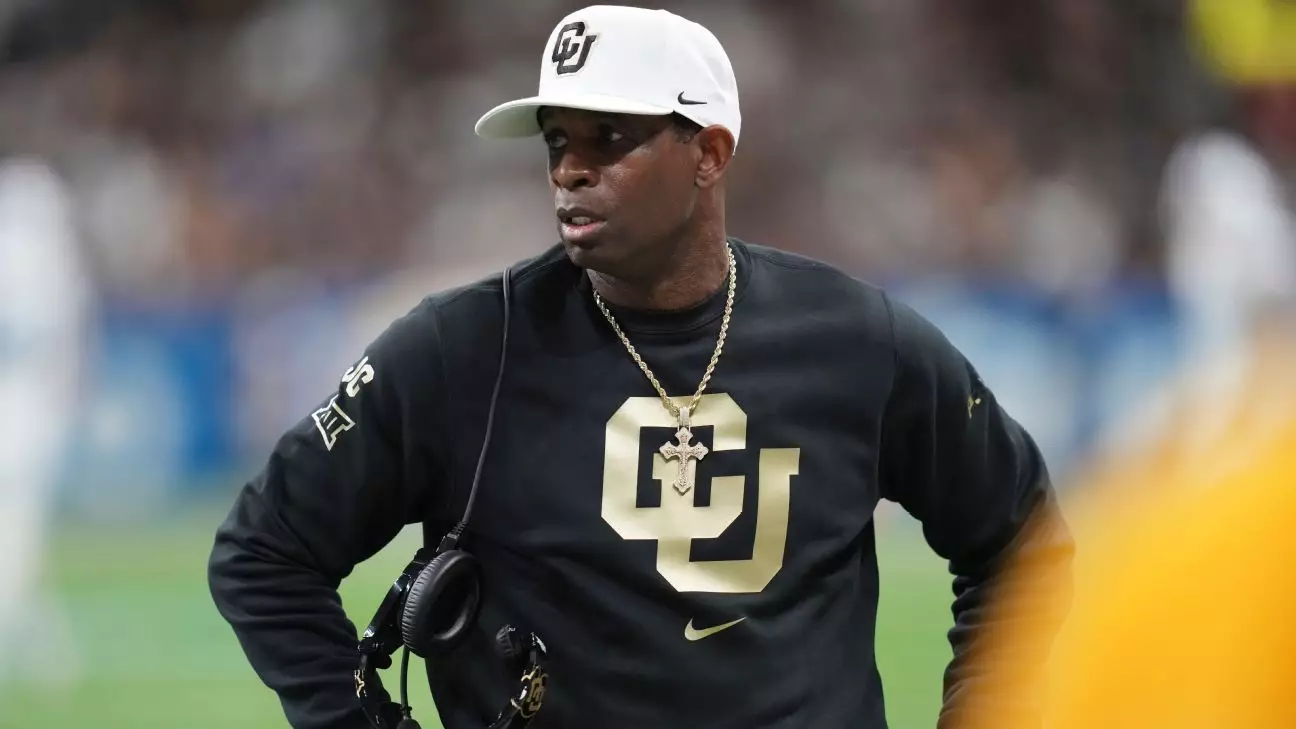In today’s fiercely competitive world of football, Deion Sanders stands as a figure of immense charisma and talent. The former NFL star and current college coach recently made headlines by choosing to remain at the University of Colorado despite overtures from the Dallas Cowboys regarding their head coaching vacancy. Sanders has captured attention not merely for his fame as a player but also for his distinctive coaching style and the seismic shift he has brought to Colorado football. However, in recent discussions, he has expressed profound reservations about coaching at the professional level.
Sanders candidly shared his thoughts during a segment of his television talk show, “We Got Time Today,” featuring NFL great Troy Aikman. The conversation delved into various dimensions of coaching, particularly focusing on comparing the physical toll and intensity of today’s NFL practices to those of the 1990s when they played together. Sanders remarked, “I couldn’t coach pro ball… because the way they practice, the way they go about it, I couldn’t take it.” His reluctance to embrace the grind of the NFL raises the question: Is the pressure of professional football too immense, even for someone with his experience?
In examining Sanders’ disinclination for NFL coaching, it’s essential to acknowledge the landscape’s transformation over the decades. The intensity and expectations that players face today are markedly different from those during Sanders’ tenure. While he thrived under high-pressure conditions as a player, the coaching demands in the contemporary NFL can require a different caliber of resilience, adaptability, and emotional endurance. His comments reflect not only a personal preference but also a growing acknowledgment of the mental and physical strain associated with modern NFL coaching.
This sentiment isn’t entirely novel for Sanders. In a previous interview, he told CBS’s “60 Minutes” that he had no desire to pursue NFL coaching roles, a stance he seems to reaffirm with every passing interaction. With a coaching record of 13-12 at Colorado, compounded with a notable 9-4 season, he continues to carve out a niche within college football, demonstrating that he is committed to developing young talent rather than navigating the often tumultuous waters of professional football.
Intriguingly, while the Cowboys searched for a new direction by interviewing various candidates, the absence of Sanders from the list of serious contenders has raised eyebrows. Aikman, one of Sanders’ former teammates, articulated what many in the football community were thinking: Sanders would have not just been an ideal fit but a commanding presence within the organization. His ability to lead and engage players could have provided the Cowboys with the authoritative figure essential for revitalizing the team’s dynamics.
Yet, as the franchise opted for in-house promotion, elevating offensive coordinator Brian Schottenheimer instead, questions linger about the decision-making process within the Cowboys’ management. Was there a strategic oversight in ignoring a seasoned player like Sanders, who possesses an unparalleled stature and credibility, particularly in light of his past glories with the team?
Aikman noted that some former teammates of Sanders were disappointed at the lack of consideration given to their friend and teammate. As he said, “You didn’t need a call from me,” suggesting that the entire situation was evident and troubling to those within the Cowboys’ community.
In the final analysis, Deion Sanders’ journey illustrates a fascinating intersection of talent, ambition, and the often harsh realities of professional sports. His choice to remain at Colorado emphasizes a growing trend among former players who find fulfillment and purpose in college football, where they can mold young athletes and influence the game they love profoundly.
This pivot away from the NFL could reinvigorate college football, infusing it with former legends who prioritize development over the rigors of pro coaching. As Sanders continues his journey, the broader football community eagerly watches—wondering if his decision to stay in college football might eventually reshape how former players perceive their pathways in the sport. In doing so, he not only redefines what success looks like beyond the NFL but also challenges the traditional significance placed on climbing the coaching ladder. Sanders’ story is indeed one of resilience and passion for the game, transcending the boundaries of conventional coaching careers.

